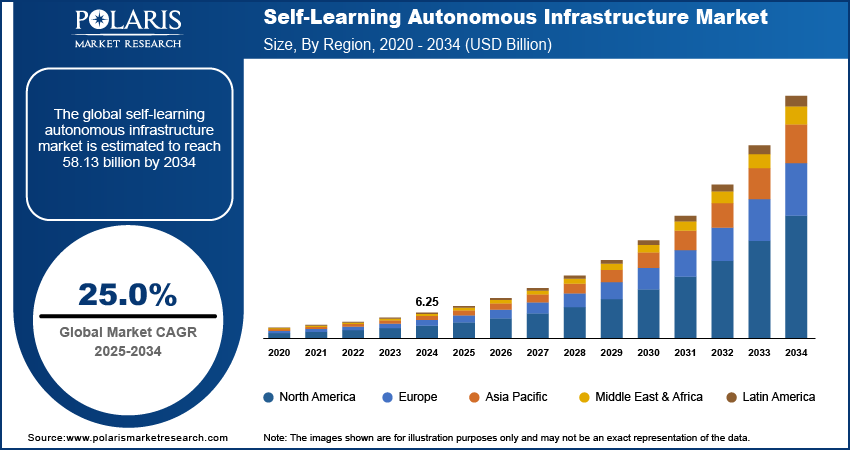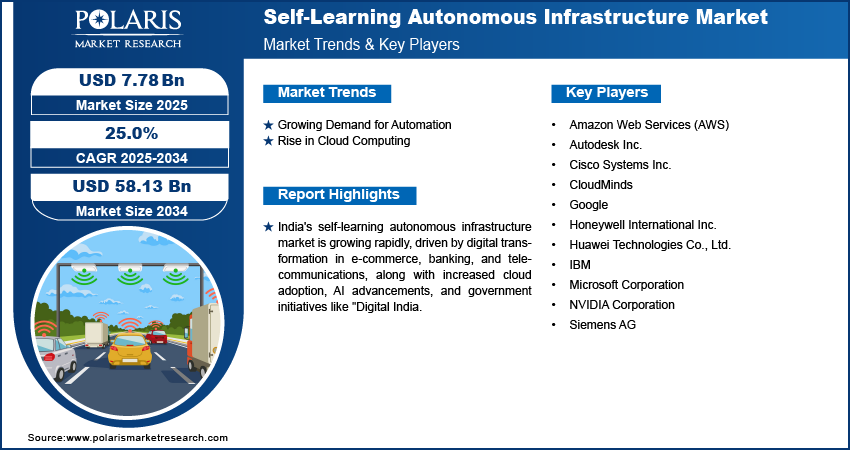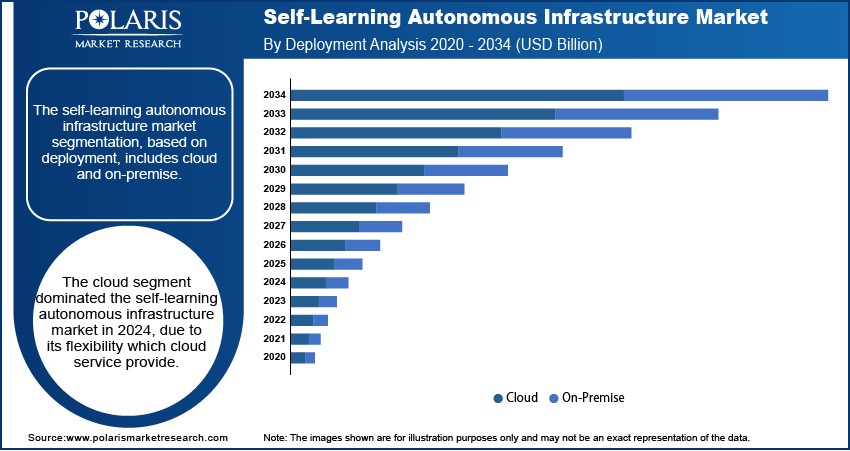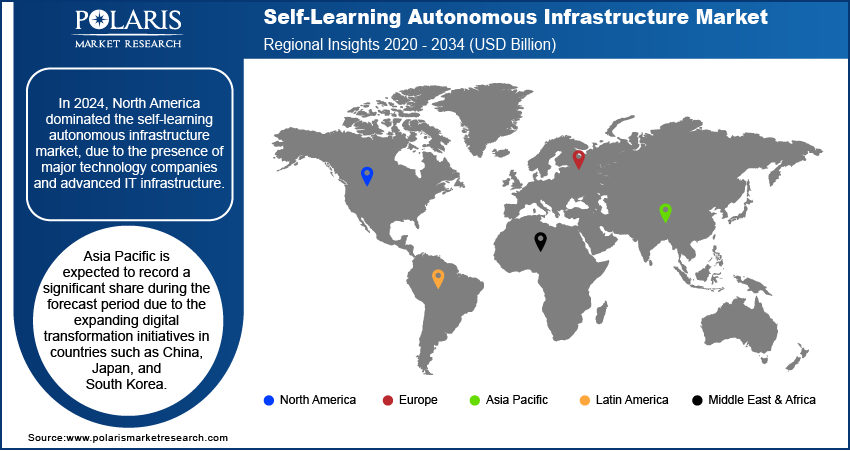
Self-Learning Autonomous Infrastructure Market Size, Share, Trends, Industry Analysis Report: By Technology, Deployment (Cloud and On-Premise), Application, and Region (North America, Europe, Asia Pacific, Latin America, and Middle East & Africa) – Market Forecast, 2025–2034
- Published Date:Apr-2025
- Pages: 125
- Format: PDF
- Report ID: PM5457
- Base Year: 2024
- Historical Data: 2020-2023
Self-Learning Autonomous Infrastructure Market Overview
Self-learning autonomous infrastructure market size was valued at USD 6.25 billion in 2024. The market is projected to grow from USD 7.78 billion in 2025 to USD 58.13 billion by 2034, exhibiting a CAGR of 25.0% during the forecast period.
Self-learning autonomous infrastructure (SLAI) uses AI and machine learning to autonomously manage, optimize, and adapt IT systems without human intervention. It continuously learns from data to improve performance, predict issues, and ensure efficient resource utilization.
Organizations are increasingly turning to self-learning autonomous infrastructure to optimize resource utilization and reduce operational costs. Traditional infrastructure management often involves overprovisioning to handle peak loads, leading to wasted resources and unnecessary expenses. Self-learning autonomous infrastructure addresses this issue by adjusting resources based on real-time needs, ensuring businesses pay only for what they use. Automating routine tasks further reduces the need for large IT teams, contributing to additional cost savings. Improving efficiency and minimizing waste enables self-learning autonomous infrastructure to help companies maximize their IT budgets while maintaining high system performance and reliability. This approach allows businesses to operate more cost-effectively without compromising service quality, thereby driving the self-learning autonomous infrastructure market growth.

To Understand More About this Research: Request a Free Sample Report
Advancements in artificial intelligence (AI) and machine learning (ML) have enabled infrastructure systems to learn from historical data and predict future needs, optimizing operations autonomously. These technologies serve as key enablers of self-learning autonomous infrastructure, allowing systems to continuously improve and adapt to new challenges. AI and ML allow self-learning autonomous infrastructure to identify patterns in system performance, forecast potential failures, and adjust configurations to improve overall efficiency. These capabilities enable organizations to stay ahead of issues, ensuring smooth operations and proactive management of IT infrastructure without requiring constant manual intervention. This approach significantly improves system reliability and reduces the risk of downtime, which in turn is driving the adoption of the self-learning autonomous infrastructure, thereby driving the self-learning autonomous infrastructure market expansion.
Self-Learning Autonomous Infrastructure Market Dynamics
Growing Demand for Automation
Businesses are increasingly looking to streamline their operations, driving a significant need for automation in managing manufacturing and IT systems. According to the Association for Advanced Automation, automation equipment units grew by 14.1% in 2024, reflecting a strong shift toward automated solutions across various industries such as manufacturing, healthcare, retail, finance, logistics, and telecommunications. Self-learning autonomous infrastructure addresses this demand by automating repetitive and time-consuming tasks such as system monitoring, troubleshooting, and resource provisioning. This reduces the need for human intervention, minimizes errors, and increases overall efficiency. Automation also frees up valuable human resources, allowing IT teams to focus on more strategic tasks, thereby expanding the self-learning autonomous infrastructure market demand.
Rise in Cloud Computing
The rapid growth of cloud computing has created a demand for more scalable and efficient infrastructure management. According to Google Cloud, 41.4% of global businesses are planning to invest in cloud platforms. Businesses that increasingly rely on cloud services find it difficult to manage these environments manually due to the complexity and volume of data and services. Self-learning autonomous infrastructure systems offer a solution by autonomously optimizing cloud resources, scaling them up or down as needed, and managing workloads effectively. This helps businesses reduce costs, improve service delivery, and ensure high availability without requiring constant human oversight, due to which businesses are increasingly adopting self-learning autonomous infrastructure systems.

Self-Learning Autonomous Infrastructure Market Segment Analysis
Self-Learning Autonomous Infrastructure Market Assessment by Technology
The self-learning autonomous infrastructure market segmentation, based on technology, includes machine learning (ML), artificial intelligence (AI), edge computing, and others. The machine learning segment is expected to witness significant growth during the forecast period. Machine learning is essential for enabling infrastructure systems to autonomously analyze data, predict future needs, and optimize performance. This technology allows systems to adapt to changing conditions, detect anomalies, and automatically adjust resources without human intervention. Businesses seeking efficient and scalable IT solutions are driving the demand for ML-powered autonomous infrastructure, thereby driving the segmental growth the market.
Self-Learning Autonomous Infrastructure Market Evaluation by Deployment
The self-learning autonomous infrastructure market segmentation, based on deployment, includes cloud and on-premise. The cloud segment dominated the market in 2024. Cloud deployment offers businesses the flexibility and scalability required to manage large and dynamic IT environments efficiently. Cloud-based self-learning infrastructure allows organizations to automate tasks, optimize resource usage, and scale their infrastructure up or down based on real-time demands. This leads to cost savings, better performance, and reduced complexity. The widespread adoption of cloud services and the growing need for agile, cost-effective solutions have made cloud deployment the preferred choice, thereby driving the segmental growth in the market.

Self-Learning Autonomous Infrastructure Market Regional Insights
By region, the study provides the self-learning autonomous infrastructure market insights into North America, Europe, Asia Pacific, Latin America, and the Middle East & Africa. In 2024, North America dominated the market due to the presence of major technology companies and advanced IT infrastructure. The region has a high adoption rate of cloud services, AI, and machine learning, which are essential for autonomous systems. Businesses in sectors such as finance, healthcare, and retail are increasingly leveraging self-learning infrastructure to improve operational efficiency, reduce costs, and enhance system performance. Strong investment in research and development, along with a supportive regulatory environment, is further driving the self-learning autonomous infrastructure market in North America.
Asia Pacific is expected to record a significant self-learning autonomous infrastructure market share during the forecast period due to the expanding digital transformation initiatives in countries such as China, Japan, and South Korea. A surge in cloud adoption, along with advancements in AI and machine learning technologies, is driving demand for more automated infrastructure solutions. Additionally, the region’s increasing focus on smart cities, e-commerce, and manufacturing automation is creating a strong demand for scalable, efficient infrastructure, thereby driving the regional footprint in the global market.
The self-learning autonomous infrastructure market in India is experiencing substantial growth, driven by its booming IT and tech industries. Companies in sectors including e-commerce, banking, and telecommunications are adopting digital transformation, which is driving the demand for efficient and scalable infrastructure solutions. Additionally, the government’s push for the "Digital India" initiative is encouraging businesses to invest in automation and self-learning systems, thereby driving the self-learning autonomous infrastructure market development.

Self-Learning Autonomous Infrastructure Market Key Players & Competitive Analysis Report
The self-learning autonomous infrastructure market opportunity is constantly evolving, with numerous companies striving to innovate and distinguish themselves. Leading global corporations dominate the market by leveraging extensive research and development, and advanced techniques. These companies pursue strategic initiatives such as mergers, acquisitions, partnerships, and collaborations to enhance their product offerings and expand into new markets.
New companies are impacting the industry by introducing innovative products to meet the demand of specific market sectors. According to the self-learning autonomous infrastructure market analysis, this competitive trend is amplified by continuous progress in product offerings. Major players in the market include Amazon Web Services (AWS); Autodesk Inc.; Cisco Systems Inc.; CloudMinds; Google; Honeywell International Inc.; Huawei Technologies Co., Ltd.; IBM; Microsoft Corporation; NVIDIA Corporation; and Siemens AG.
Microsoft is a multinational technology company headquartered in Redmond, Washington. Microsoft offers various products and services, including operating systems, productivity software, gaming consoles, and cloud-based solutions. Its flagship product, Microsoft Windows, is the world's most widely used operating system. Other popular products include Microsoft Office, Skype, and the Xbox gaming console. Microsoft has invested heavily in artificial intelligence (AI) and machine learning technologies in recent years. The company has been using AI to improve its products and services and developing new AI-based applications. For instance, Microsoft's Cortana virtual assistant uses machine learning to provide personalized recommendations and insights to users. Microsoft has also developed several AI-based products and services, including the Azure Machine Learning platform, which allows developers to build, deploy, and manage machine learning models at scale. The company has also developed AI tools for healthcare, such as Microsoft Healthcare Bot, which helps patients get answers to their health-related questions. Furthermore, Microsoft is actively involved in AI research and development and has established partnerships with leading universities and research institutions worldwide. The company is committed to using AI to solve the world's most pressing problems, such as climate change, healthcare, and education. Microsoft provides Azure AI Infrastructure that delivers high-powered performance for compute-intensive AI workloads like deep learning. It offers scalable VMs and industry-leading machine learning operations and supports building advanced AI solutions.
International Business Machines Corporation (IBM) is an American multinational technology company operating in over 75 countries. It is the largest technology firm in the world and the second most valuable worldwide brand. The organization has an extensive network of 80,000 business associates who help it handle 5,200 clients, including 95% of the Fortune 500. The company provides healthcare and healthcare payer solutions through the IBM Watson Health business. However, as of 2022, the IBM Watson Healthcare business was purchased by Merative. IBM Watson started in 2010, is a supercomputer that uses Digital Workplace (AI) and advanced analytical tools to operate optimally as a "question-answering" machine. For businesses and organizations, IBM Watson uses Digital Workplace to optimize employees' time, automate complex processes, and predict future outcomes. IBM's AI provides infrastructure that offers a hybrid approach with high-performance computing, robust security, and seamless multi-cloud integration. It optimizes AI workloads, boosts inferencing, and accelerates data transformation.
Key Companies in Self-Learning Autonomous Infrastructure Market
- Amazon Web Services (AWS)
- Autodesk Inc.
- Cisco Systems Inc.
- CloudMinds
- Honeywell International Inc.
- Huawei Technologies Co., Ltd.
- IBM
- Microsoft Corporation
- NVIDIA Corporation
- Siemens AG
Self-Learning Autonomous Infrastructure Industry Developments
In March 2025, KIP Protocol's Superior AI Agents were launched, marking the introduction of a self-learning framework for autonomous AI, evolving independently of human-designed benchmarks and datasets.
Self-Learning Autonomous Infrastructure Market Segmentation
By Technology Outlook (Revenue USD Billion, 2020–2034)
- Machine Learning (ML)
- Artificial Intelligence (AI)
- Edge Computing
- Others
By Deployment Outlook (Revenue USD Billion, 2020–2034)
- Cloud
- On-Premise
By Application Outlook (Revenue USD Billion, 2020–2034)
- Smart Cities
- Data Centers
- Smart Manufacturing
- Healthcare
- Others
By Regional Outlook (Revenue USD Billion, 2020–2034)
- North America
- US
- Canada
- Europe
- Germany
- France
- UK
- Italy
- Spain
- Netherlands
- Russia
- Rest of Europe
- Asia Pacific
- China
- Japan
- India
- Malaysia
- South Korea
- Indonesia
- Australia
- Rest of Asia Pacific
- Middle East & Africa
- Saudi Arabia
- UAE
- Israel
- South Africa
- Rest of Middle East & Africa
- Latin America
- Mexico
- Brazil
- Argentina
- Rest of Latin America
Self-Learning Autonomous Infrastructure Market Report Scope
|
Report Attributes |
Details |
|
Market Size Value in 2024 |
USD 6.25 billion |
|
Market size Value in 2025 |
USD 7.78 billion |
|
Revenue Forecast in 2034 |
USD 58.13 billion |
|
CAGR |
25.0% from 2025–2034 |
|
Base Year |
2024 |
|
Historical Data |
2020–2023 |
|
Forecast Period |
2025–2034 |
|
Quantitative Units |
Revenue in USD billion and CAGR from 2025 to 2034 |
|
Report Coverage |
Revenue Forecast, Market Competitive Landscape, Growth Factors, and Industry Trends |
|
Segments Covered |
|
|
Regional Scope |
|
|
Competitive Landscape |
|
|
Report Format |
|
|
Customization |
Report customization as per your requirements with respect to countries, regions, and segmentation. |
FAQ's
The self-learning autonomous infrastructure market size was valued at USD 6.25 billion in 2024 and is projected to grow to USD 58.13 billion by 2034.
The global market is projected to register a CAGR of 25.0% during the forecast period, 2025-2034.
North America had the largest share of the global market in 2024.
The key players in the market are Amazon Web Services (AWS); Autodesk Inc.; Cisco Systems Inc.; CloudMinds; Google; Honeywell International Inc.; Huawei Technologies Co., Ltd.; IBM; Microsoft Corporation; NVIDIA Corporation; and Siemens AG.
The cloud segment dominated the self-learning autonomous infrastructure market in 2024, due to its flexibility which cloud service provide.
The machine learning segment is expected to witness significant growth in the forecast period as it is essential for enabling infrastructure systems to autonomously analyze data, predict future needs, and optimize performance.
